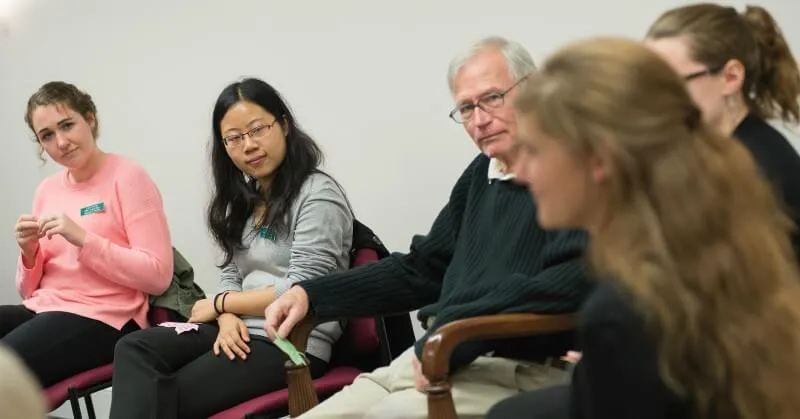The ability to understand health care from a multidisciplinary viewpoint and recognize a patient’s individual needs are skills essential to becoming an excellent health care provider. The best way to learn these skills is to work interprofessionally with a variety of practitioners in a real-world setting.
That’s the idea behind PRNU 121: Gerontology for Health Sciences, offered for fall 2018 to students majoring in Nursing, Exercise Science, Communication Sciences and Disorders and Health Sciences.
The course focuses on the societal implications of aging and provides a foundation for the care of older adults. Students examine the nature of aging and explore factors that affect an older adult’s ability to maintain independence, including physiological, cognitive, emotional, social and spiritual challenges.
Students interact with a volunteer older adult resident in a community assisted living facility. Guided iterative modules promote ongoing conversations between the student and that older adult. Each module includes focused discussion topics, individual and group reflections and debriefing exercises. Examples of topics include: The Aging Experience, Perspectives of the Healthcare System, The Role of Health Care Providers, Maintaining Good Health, and Future Goals and Aspirations. The experience give students direct insight into the experience of elders and provides an opportunity to practice communication skills, creativity, and understanding of the many diverse needs of this population.
“I learned that each of us has a unique story to tell and that our life choices become more important as we age. Choices we make when we are 20 can affect our health in our 80s; and now I know to take the time to listen and learn my patients’ stories and help them cope with their choices, or improve their choices,” said Charlene Mitchell, Nursing '19, who took PRNU 121 last fall.
The course is multidisciplinary and interprofessional. In the classroom, students majoring in Nursing, Exercise Science, Communication Sciences and Disorders and Health Sciences work together to explore issues impacting older adults and hear from leading experts within the field of aging. They will apply this knowledge as they work with older adults.
“Students will work with community senior volunteers in interprofessional teams,” said Nursing Professor Jason Garbarino, who teaches the course. “Students identify and lead activities which integrate and positively impact our local older adult community.”
Those who have taken Gerontology for Health Sciences say it changed their views about working with older adults and helped them become better health practitioners.
"Working with elders in our community really opened my eyes. I was able to form a relationship with each person and gain wisdom on life from the older population,” said Shannon Lyons, Nursing '19, who took the course last fall. “It gave me an open mind going into nursing on how to connect with the elderly and not be ageist in my care.”
